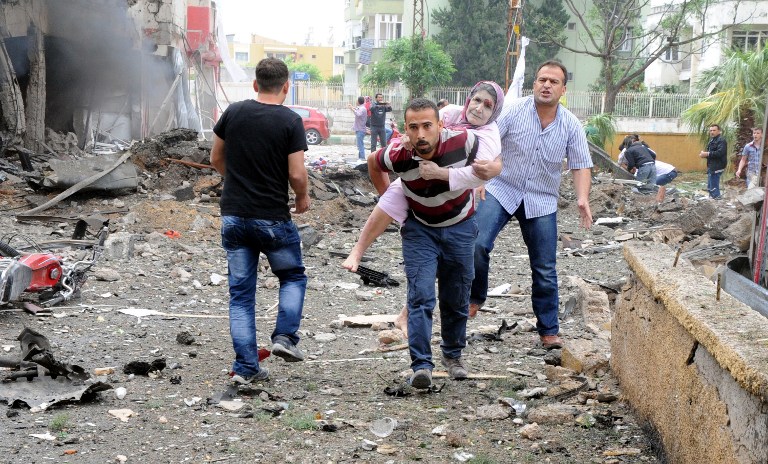SUMMARY
This is AI generated summarization, which may have errors. For context, always refer to the full article.

REYHANLI, Turkey – Twin car bombs killed at least 43 people and wounded 100 Saturday, May 11, in a Turkish town near the Syrian border, in an attack Ankara blamed on pro-Damascus groups.
The bombings were the deadliest in Turkey, a key supporter of the Syrian opposition, since the conflict started more than two years ago.
Rescuers were hunting for possible survivors buried underneath the rubble of buildings destroyed by the blasts in Reyhanli, one of the main Turkish hubs for Syrian refugees and rebels.
Over a dozen ambulances and several air ambulances rushed to the scene to tend to the victims, NTV television said, adding that the town hall had suffered major damage.
A number of cars were also completely wrecked in the attacks which caused a power cut in the area around Reyhanli, according to local media.
Deputy Prime Minister Besir Atalay said the blasts had killed at least 43. Several of the 100 wounded were in critical condition.
“The people and the organization who carried out this attack have been identified,” Interior Minister Muammer Guler told national TRT television.
“We have established that they are linked to groups supporting the Syrian regime and its intelligence services,” he said.
Turkey distanced itself from its erstwhile ally soon after Syrian President Bashar al-Assad started cracking down on pro-democracy protests in 2011.
Ankara has since become a rear base for the Syrian rebellion and Damascus has already been blamed for a string of attacks on Turkish soil.
Atalay said that the perpetrators of Saturday’s attacks did not appear to have crossed into Turkey from Syria but were already in the country.
Guler said the regional governor had been sent to Reyhanli “to put the necessary security measures in place.”
The attack sowed panic in Reyhanli, a town of about 60,000 people, leading to tensions between youths and Syrian refugees and forcing police to fire into the air to disperse the crowd.
Turkish Foreign Minister Ahmet Davutoglu, on a visit to Berlin, said it was “not a coincidence” that these bombings occurred as international diplomatic efforts to solve the Syrian crisis were intensifying.
“It is not a coincidence that this should happen in a period where there is an acceleration of efforts on Syria in the whole world,” he told reporters.
“Nothing will go unanswered,” added Davutoglu, vowing the culprits would be brought to justice.
The United States and Russia, one of the few remaining supporters of Assad’s regime, pledged this week to relaunch efforts to solve the conflict, which the United Nations estimates has killed 70,000 people since March 2011.
Israeli Prime Minister Benjamin Netanyahu will soon visit Russia for talks with President Vladimir Putin, officials said earlier Saturday, amid a flurry of diplomatic activity.
Turkish Prime Minister Recep Tayyip Erdogan, who earlier this month branded Assad a “butcher”, is due to meet US President Barack Obama in Washington on Thursday.
The West swiftly denounced the attacks.
French President Francois Hollande condemned them “in the strongest possible terms” while UN leader Ban Ki-moon said the perpetrators must be “brought to justice.”
US Secretary of State John Kerry also condemned the “awful news” and said it struck “an especially personal note for all of us given how closely we work in partnership with Turkey, and how many times Turkey’s been a vital interlocutor at the centre of my work as secretary of state these last three months.”
Meanwhile, the Syrian opposition National Coalition said the attacks were designed to drive a wedge between Turks and Syrians.
“The Coalition sees these heinous terrorist acts as an attempt to take revenge on the Turkish people and punish them for their honorable support of the Syrian people (…)”
The bombings were “a desperate and failed attempt to sow discord”, the opposition said in a statement.
Reyhanli lies in southern Turkey near the Cilvegozu crossing opposite Syria’s rebel-controlled Bab al-Hawa border post, the busiest crossing between the two countries.
The border area has witnessed a number of deadly attacks as the conflict in Syria spills over into Turkey, whose government has become one of its harshest critics.
In February, a car bomb attack at Cilvegozu which Turkey blamed on Syrian intelligence agents killed 17 people and wounded 30.
Earlier this month, one police officer was killed and six other people wounded when Syrians trying to cross into Turkey opened fire in a border buffer zone.
Saturday’s attack came as Turkey ramped up its rhetoric against Assad, with Erdogan accusing the regime in Damascus of deploying chemical weapons, crossing a “red line” set by Obama.
“It is clear the regime has used chemical weapons and missiles,” he told NBC News on Thursday, May 9, without elaborating but urging the United States to take more action against Syria. – Rappler.com
Add a comment
How does this make you feel?
There are no comments yet. Add your comment to start the conversation.